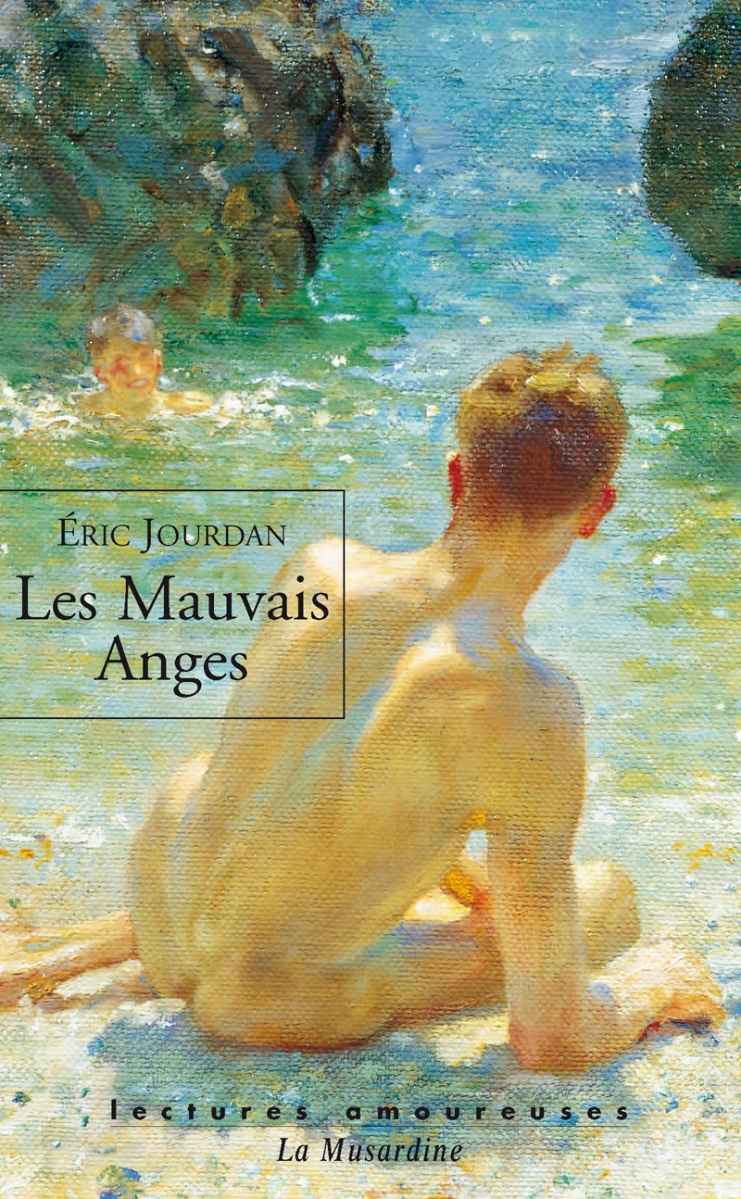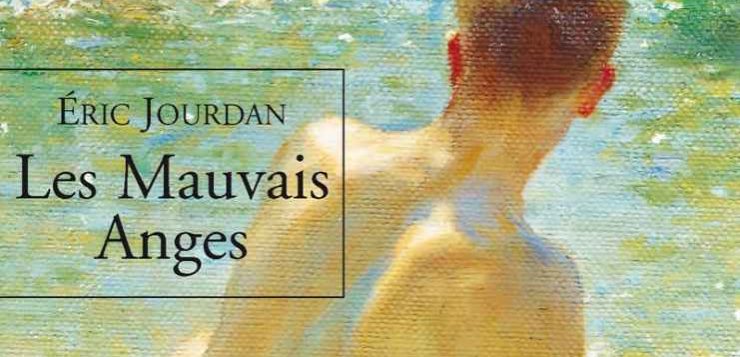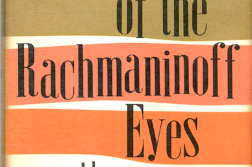ÉRIC JOURDAN’S Les mauvais anges, or Wicked Angels, was banned in France shortly after its publication in 1955, and the ban was only lifted thirty years later. The story of a sadomasochistic amour fou between two teenage boys was translated into English by Richard Howard in 1963 and titled Two. (This edition is now a rare book.) A translation by Thomas J. D. Armbrecht was published by Harrington Park Press in 2006, a time when Jourdan himself was still living. (He died at 84 in 2015.) I recently found a copy of that translation at the Strand Bookstore and fell in love with Wicked Angels and with the elusive Jourdan himself.
 Even Jourdan’s birth date is a mystery. Wikipedia gives it as 1930, though other sources list it at 1938. Being young was important to Jourdan, so perhaps he moved the date forward. He had an older ally in the writer Julien Green (1900–1998), a noted novelist, memoirist, and diarist who adopted Jourdan and provided him with some stability. Green was in his mid-fifties when Jourdan published Wicked Angels. He was gay but conflicted by his religious upbringing, whereas Jourdan was a pagan and an iconoclast who rejected labels and categories.
Even Jourdan’s birth date is a mystery. Wikipedia gives it as 1930, though other sources list it at 1938. Being young was important to Jourdan, so perhaps he moved the date forward. He had an older ally in the writer Julien Green (1900–1998), a noted novelist, memoirist, and diarist who adopted Jourdan and provided him with some stability. Green was in his mid-fifties when Jourdan published Wicked Angels. He was gay but conflicted by his religious upbringing, whereas Jourdan was a pagan and an iconoclast who rejected labels and categories.
Jourdan agreed to a rare interview via fax that was published on Jean-Louis Garac’s blog in 2011, and he told Garac that he was entertained by his mysterious reputation: “Certainly I live as I please, far from this damn literary world which must not exist outside its own navel.” When asked about the banning of Wicked Angels and how that might have prevented recognition of his subsequent writings, he replied: “I had fun! I made love twice as much as usual, if possible. And if that blocked all ‘recognition,’ well, basta!” He proclaimed that his work was “anti-everything except love,” and that it had “no fate in the world of appearances.” Jourdan boasted of how he and some friends “stayed young beyond the limits allowed,” and how he saw life as a mixture of “brain, heart, and ass.”
There are so many questions surrounding Jourdan and his most famous novel, and the most pressing for me is the extent to which Wicked Angels is autobiographical. Pierre and Gerard, the two lovers in Wicked Angels, are cousins. Both of their mothers have died, so they live together with their fathers. The fathers can see what’s going on between the boys and feel conflicted, particularly Gerard’s father.
The first half of Wicked Angels is told in the first person by Pierre, who describes Gerard asleep in the dried grass as if his lover is a part of nature. The vividness of Pierre’s sensual details in these early pages is overpowering, transporting—a teenager’s riot of color, form and associations. These young male cousins want to be one person. At one point Pierre even says: “I caressed Gerard by caressing my own body.” But there is hatred and masculine competition between Pierre and Gerard, and this expresses itself in the way they make love: violently, all-consumingly, with Gerard usually taking the role of bottom and letting Pierre have “fun” by hitting him in the face as they fuck.
Gerard has a cleft chin, unruly curly hair, and one of the most attractive male asses in all of literature. He causes a sensation wherever he goes. Consequently, pressure is building on Gerard throughout Wicked Angels, because he is always an object of desire for men who want to hurt him precisely because they’re aroused by him against their will. In the book’s most daring scene, even Gerard’s own father succumbs to the lure of his son’s lush body and spanks him in front of Pierre, which provides a source of confused sexual satisfaction for the father.
Gerard destroys his father’s carefully cultivated garden and also the aviary of a nearby family of rich boys, who get their revenge by gang-raping Gerard, a punishment that Gerard accepts submissively, though part of his mind seems to have blacked it out. Does this gang rape actually happen? It is described only vaguely by both boys, as if it’s a sexual fantasy rather than a real event. More vivid is the scene in which Gerard sits on the face of one of these rich boys and allows his ass to be “violated” by the boy’s tongue (“his profile spread my cheeks,” Gerard says in his section of the book). This is perhaps the most erotic sex scene in Wicked Angels, and the one most steeped in shame.
No doubt Jourdan wrote some of Wicked Angels for onanistic purposes, but the imagery is often so poetic that it transcends the pornographic. At one point Pierre says of Gerard that “soapsuds covered the back of his neck like lace.” Pierre is the more romantic and articulate of the two, even going so far as to say that his love for Gerard has given him religious faith, but it’s a faith that has its basis in sexual obsession. Says Pierre of their lovemaking: “I became familiar with the ever-increasing swells of this ocean of pleasure, with its obscure restful depths.”
When Gerard takes over the narrative, he comes out with a memorably sexual image of the jealousies of older people observing their affair: “Lovers like us are so filled with their dreams that their love unwittingly spurts from them like a fountain. Everyone around them is inadvertently drenched in it.” And he has moments as lucid as Pierre’s: “I feel like master and slave at the same time, which makes me doubly susceptible to the inconsistencies of power and submission, both of which are fragile.” He sees that his love for Pierre has no value in 1955 because it “didn’t represent anything in terms of money or prestige.” Putting aside the judgments of society, Gerard finally insists near the end of his section: “Love is a kind of disaster.” The violent ending of Jourdan’s book is a gesture towards completion and wholeness, and maybe not too believable as events that could actually happen.
Jourdan found words as a young man for the sensations of togetherness he had either experienced or imagined, and he lived a long life in the company of his adoptive father Julien Green, who himself lived to be 97. So Jourdan proved that sometimes the disaster of love can be survived, at least physically. He scorned the duties inherent in attending school, making money, courting respectability, and building a reputation, prizing instead the free pursuit of beauty and sex. Clearly the excitements of sexual expression and rebellion were more important to Jourdan than his writing and its reception, but the writing he left behind deserves further study, translation into English, and celebration.
Dan Callahan is the author of the novel That Was Something (2018) and five books on the art of acting.





